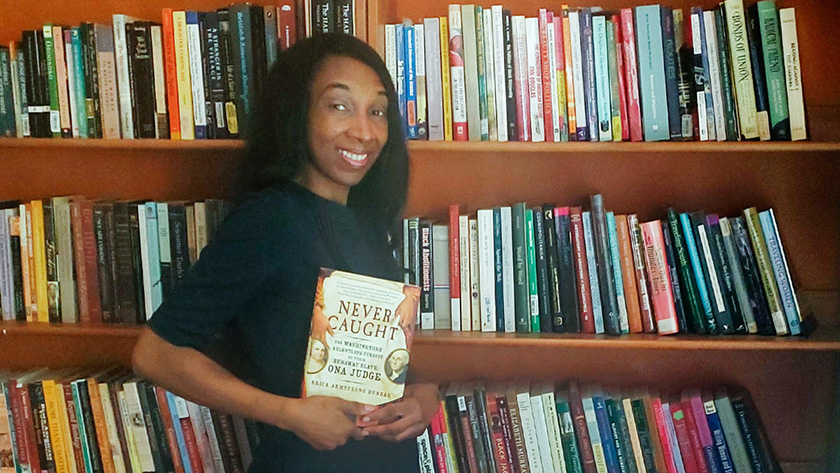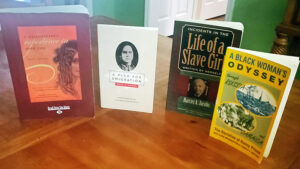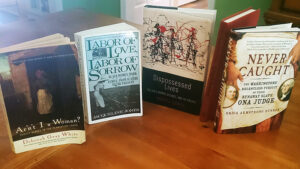
Katrina Anderson, a doctoral candidate in history at the University of Delaware, collects books about women of African descent within the Atlantic World from 1600-1865.
Finding Our Heroes: Sharing Hidden Histories with the Next Generation
Article by Allison Ebner | Photos courtesy of Katrina Anderson
This is the last in a series of articles highlighting the winners of the third annual Seth Trotter Book Collecting Contest, sponsored by the Friends of the University of Delaware Library.
Katrina Anderson, a doctoral candidate in history, has instilled a deep affinity for reading in her daughter. When Katrina’s daughter was in kindergarten and first grade, they read 1,500 books together, earning the young reader some well deserved trophies. This year, her daughter finished second grade having read an impressive 500 books on her own.
But there is one major difference in their shared love of reading.
Growing up as an African American woman, Katrina didn’t have easy access to stories and histories of Black female heroes. Aside from Rosa Parks and Marian Anderson, she wasn’t even aware there were other noteworthy Black women in American history until she started college.
Katrina is working to ensure that isn’t the case for her daughter by building the book collection, Uncovering the Hidden Lives of Women of African Descent Within the Atlantic World, 1600-1865.

Katrina plans to use many of the books in her collection as sources in her dissertation, including these titles.
Katrina’s collection of approximately 150 books focuses on Black women’s history and travels not just in the United States, but throughout the Atlantic World—think Europe, South America, the Caribbean Islands and even Russia. (This collection represents just a quarter of her entire collections, which also include another 500 books on women’s experiences—whether black, white or indigenous—through the 21st century.)
The collection brings together the often marginalized and overlooked experiences and voices of Black women. You can learn about Sarah Parker Remond, a transnational abolitionist; Eliza Potter, a hairdresser who traveled in the U.S. and Europe; Rebecca Protten, a missionary who helped spread Black Christianity throughout the world; Nancy Princa, a businesswoman and missionary who traveled to Russia and Jamaica; sisters Anne Hart Gilbert and Elizabeth Hart Thwaites, educators and antislavery activists who became the first writers within the Afro Caribbean world; and so many more.
For Katrina, building the collection has been a labor of love—and research. While at UD, she has worked with scholars who have increased her knowledge of black women’s history, including Erica Armstrong-Dunbar, former Blue and Gold Distinguished Professor of Black American Studies and History, and Anne Boylan, professor emerita of history and of women and gender studies.
The collection, which she started building 10 years ago, is a personal passion and a direct result of her dissertation work on the travel experiences of Black women.
“It’s almost where I don’t see this as work because I love these books so much,” Katrina explained. “It’s exciting to see how the stories and narratives influence my own work. Part of being a historian is picking up [where an author left off] or where they had not gone, and you’re pushing that envelope to fill in those missing gaps for the historiography. So, it’s been a very, very exciting process.”
Finding these books—both new and old—is part of the fun. In addition to searching Amazon, Alibris, AbeBooks and other online retailers for titles of interest, Katrina scours dissertations in progress to see when they may be turned into books; discovers new sources via the New Books Network podcast channels; and combs through scholarly journals and Library catalogs for suggestions. She is committed to curating a robust collection and giving a home to the stories that have gone untold for too long.

These are a few of the books that inspired Katrina’s interest in the subject and the birth of this book collection.
“I’m always looking, I’m always searching, and I’m always finding something that can be added to my collection,” Katrina said, noting a boom in the number of books being published on Black women’s history in the last five to 10 years. “The women who make up this collection have often been silenced for so long, and so through, I would say, the meticulous research of many historians, they have been able to bring their voices forward. And I’m trying to do the same in my dissertation and my collection.”
This ability to share such important histories with others, especially her daughter, is the most rewarding part of collecting. Katrina aims to build such a large collection that she can donate a portion to students for further learning and the rest to her daughter, a budding collector already.
“My daughter will be able to see those Black female heroes [I didn’t learn about growing up] because I have a collection of them now,” Katrina explained. “She’ll be able to learn about their experiences, people for her to look up to. She can see that women’s lived experiences are very varied, and that there are so many things that you can do and so many options that you have.”
As Katrina builds her collection, reading each book and discovering these incredible women’s stories, she is changed too. “Each and every book in this collection is near and dear to my heart,” she said. “They are a part of who I am, and they’ve shaped my viewpoints and how I see things. You are able to see how far we have come based on their experiences, yet also see how far we still have to go.”
Seth Trotter Book Collecting Contest
Katrina Anderson is one of three winners of the Friends of the University of Delaware Library’s 2021 Seth Trotter Book Collecting Contest. The other winners are Margaret O’Neil and Logan Gerber-Chavez. The Friends created the contest to encourage reading and research, the creation of personal libraries, and an appreciation of printed or illustrated works for pleasure and scholarship among UD undergraduate and graduate students. If you’d like to support the Friends and the future of this contest, you can do so here.
